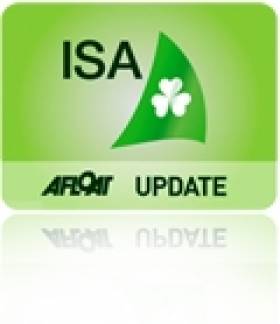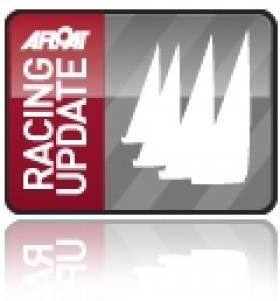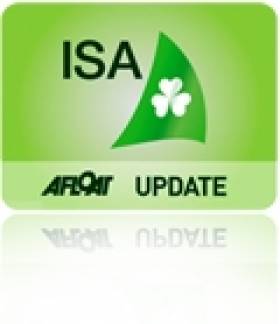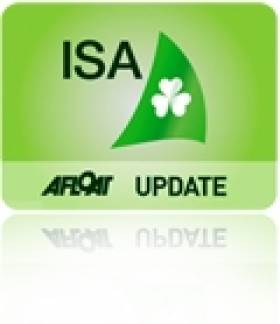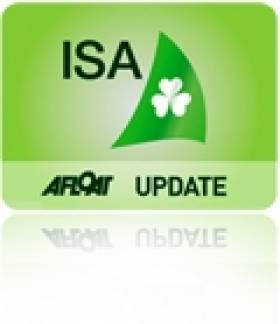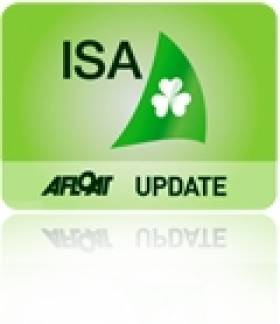Displaying items by tag: Ewen Barry
Nicholas O'Leary Produces Hat Trick in All Ireland Re Run
The All Ireland Championships at Kinsale today turned out in the end to be an event well worth the long wait and provided thrilling competition from start to finish writes Claire Bateman. It was sailed in a three metre swell between the Bullman Buoy and Sandycove. It was particularly difficult for the Race Committee under PRO David O'Brien in the continuous undulating swell.

Nicholas and his winning crew Adam McCarthy and Alex Barry in Kinsale this afternoon. Photo: Bob Bateman. More photos on the gallery HERE
After four races the Race Committee were calculating the results only to find that they had three Royal Cork crews tied on five points each including the twice previous holder Nicholas O'Leary, his father Anthony and Niall Kenefick who was sailing with his two sons David and George. And so the competition went down to the wire with the result dependant on the final race. Nicholas O'Leary triumphed taking his third consecutive Championship win, the first ever to do so, followed by Anthony O'Leary in second place and Niall Kenefick taking third place.
This exceptional result finally puts to bed any previous suggestions that local knowledge could prevail in the results by the competition taking place in the home club of the winner.
In his acceptance speech Nicholas said it was very difficult in the first race today to have to protest his father who was coming in on port to the mark but with a twinkle in his eye said it had to be done!
After it was all over one wag suggested to Nicholas that he should now seek to keep the trophy as he had won it three times in a row. The reply should be rather interesting!
Speaking at the reception afterwards the ISA said the three year sponsorship had now expired so they will be looking for new sponsors but such was their confidence in the continuance of the fleet they have already ordered new sails.
Results:
1. Nicholas O'Leary
2. Anthony O'Leary
3. Niall Kenefick
4. Garrett May
5. James Espey
6. Nick Walsh
7. Niall Henry
8. Ewen Barry
All Ireland Champs Move to Kinsale
The re-run of the All Ireland Sailing Championships will take place in Kinsale and not Crosshaven on November 20th according to a press release from the Irish Sailing Association published today.
A minimum of three races must be completed for the competition to conclude and the ISA Helmsman's Trophy awarded.
The final, originally scheduled to take place in Royal Cork Yacht Club on the 26th of September, had to be abandoned due to an absence of wind.
The competition will be sailed in the ISA SailFleet J80's which are currently based in Kinsale Yacht Club. Due to the difficulty in safely sailing the fleet from Kinsale to Crosshaven the venue had to be changed, however the host club remains Royal Cork Yacht Club who are now kindly assisted by Kinsale Yacht Club.
8 teams will be competing for the ISA Helmsmans Trophy. As this competition is recognised as a new event, no previous points shall be carried forward. Each competitor begins with a blank score card.
The finalists are:
Anthony O'Leary
Ewen Barry
Garrett May
James Espey
Neil Kenefick
Niall Henry
Nicholas O'Leary
Nick Walsh
Who'll win? We're starting a readers poll on Monday. Click back to cast your vote!
Barry and Kenny on Top form in Cork 5o5 Nationals
12 boats took part in the years 505 Irish Nationals and British Isles Championships. Following a delayed Swansea Cork ferry, the four UK boats made it to MBSC at 12 30pm on Saturday.
Racing on Saturday was held in Cuskinny with the breeze touching 25 knots on the downwind leg to the race area. The OOD team of Ciarán McSweeney and David Barry got racing underway at 3 15pm with the north westerly breeze softening to 12 to 15 knots. Ewen Barry and Simon Lake(8945) lead at mark one followed by Charles Dwyer and Conor Kelly (8961). Dwyer and Kelly's race came to an end at the first gybe mark with an impressive capsize( their first of two in the race). Barry and Lake showed impressive upwind speed with Barry and Kenney flying on the downwind in perfect reaching conditions. Barry and Kenney eventually took the lead on the top reach of the last leg and managed to hold on to take first, Barry and Lake second and Ronan Kenneally and Denis Cartwright taking a well deserved third place.
In race two, Barry and Kenney lead all the way round with some great battles for the 2, 3, 4 positions going on behind. Brian Jones and Gary Frost sailing 7771 came out ahead taking 2nd place with Ewen and Simon in 3rd. With the sun going down and a beat home the OOD team made the call to head for home and the warmth of the clubhouse.
Day 2 again brought great sailing conditions with a cold Northerly breeze and brilliant sunshine, racing got underway again in Cuskinny at 11 30am. Three races were held, in 8 to 12 knots. Denis Cartwright was joined by the third Barry brother Colin for the rest of the weekend as Ronan Kenneally had laser sailing commitments. Barry and Kenney again showed their pace on the day and with two firsts and a fourth were going to be hard to catch. Dwyer and Kelly found their footing with a 3, 1, 2 winning the second race by a considerable margin. Colin and Denis had a very consistent day with a 2, 3, 3 and had some extremely close battles with Dwyer and Kelly. Jones and Frost struggled in the lighter breeze posting a 5, 6, 5 leaving some work to do to catch back up to the group battling for second. Wade and Robert Cuppage added another boat to the racing today in Ethel, possibly one of the most famous 505's around and still sporting a deck stepped mast. Damage to Mikie and Josh's boat caused them to retire from races 4 & 5 with redress granted later as they were found to be not at fault. This meant that the battle for the junior title with James and Lisa O'Brien was hotting up and all to play for on the last day.
Going into the last day, with a gale warning in place for Monday, Alex and Adam lead on 4 points, Charlo and Conor in second on 10 points, Ewen & Simon and Colin & Denis tieing for third on 11 points.
Sunday night brought the usual banter with plenty or arm wrestling, chair jumping and general tough man competitions in the bar and stories of days gone by from Jim.
Monday morning brought new conditions with a strong southerly breeze filling in to the bay. As there were big winds forecasted and ferries to catch, Dave and Ciarán decided to hold racing in the bay. Conditions were good for the 505 with flat water and 18 to 22 knots of breeze. There was no catching Barry and Kenney again with their downwind pace proving to be the winning factor. They posted another two firsts to take the title counting all 1sts. Charlo was joined by Ronan Kenneally this time and despite a lightweight crew they took two seconds on the day to cement their second place overall. With Ewen and Simon breaking an outhaul in the first race they now had to count a 7th and a 3rd in the final race was not enough to fight off Colin and Denis. Brian and Gary's big breeze pace was back and the posted a 3rd and a 4th. Jim and Barney had a great first race taking 5th but a capsize in the second race but them out of the race.
In the juniors, Mikie and Josh posted a 6th and a 7th to take the junior title with Lisa and James' equal 6th and a 7th not enough to catch up.
505 Irish Nationals and British Isles Championships – MSBC 23rd to 25th October 2010
1 IRL/GBR 8945 Alex Barry & Adam Kenny 1 1 1 4 1 1 1
2 IRL 8961 Charles Dwyer & Conor Kelly 7 4 3 1 2 2 2
3 IRL 8497 Colin Barry & Dennis Cartwright 3 5 2 3 3 4 5
4 IRL/GBR 8955 Ewen Barry & Simon Lake 2 3 4 2 7 12 3
5 IRL 7771 Brian Jones & Garry Frost 4 2 5 6 5 3 4
6 GBR 8907 Jim Berry & David Barnes 6 7 6 5 10 5 10
7 IRL 8552 Michael O'Brien & John O'Gorman 5 6 7 8 4 12 13
8 IRL 8380 Charles & Jeannie McCarthy 8 8 8 7 6 12 8
9 IRL 8*08 Mike O'Brien & Josh Barrett 10 10 9 APA8.4 APA8.4 6 7
10 IRL 8679 James & Lisa O'Brien 9 9 11 10 8 7 6
11 IRL 8216 Joanne McCarthy & Steven O'Reilly 13 13 10 9 9 12 13
12 IRL 7852 Wade & Robert Cuppage 13 13 13 11 11 13 13
All Ireland Champs to Sail Again on November 20
After an abandonment due to lack of wind in early October and a long wait for news of a new date, the Irish Sailing Association has announced its All Ireland Championship will now take place on November 20th.The competitors have agreed to be available on this weekend to sail but the announcement on the ISA website does not name the venue, presumably the original location, Cork Harbour. the finalists and drawn boats are:
Final Flight
1. McCann Fitzgerald Anthony O'Leary
2. D/L Marina Neil Kenefick
3. O'Leary Insurance Ewen Barry
4. Smyths Toys Nicholas O'Leary
5. Dyno Rod Garrett May
6. Smart Niall Henry
7. KPMG James Espey
8. Irish Examiner Nick Walsh
All Ireland's Eye New Date at End of November
Following the abandonment of the Irish Sailing Association's All Ireland Sailing Championships in the last weekend of September the national authority is still seeking a suitable resail date. "Currently we're in touch with the competitors. It's looking like the end of November", Racing manager Ed Alcock told Afloat.ie this week. The event was scrubbed due to lack of wind but a junior event was completed elsewhere in Cork Harbour.
A new Notice of Race (NOR) will be published for the event. Eight helmsmen, including the double winner Nicholas O'Leary will be invited in a new final consisting of five races. The eight finallists are Anthony O'Leary, Neil Kenefick, Nicholas O'Leary, Garrett May, Niall Henry, James Espey, Nick Walsh, Ewen Barry.
ISA Seek New Date for All Ireland Event
Following the abandonment of the All Ireland Sailing Championships at Royal Cork last weekend due to lack of wind the Irish Sailing Association (ISA) has yet to announce dates for the rescheduled event. An autumn date to accomodate all concerned is the objective, the association said yesterday. The eight finalists involved are; Anthony O'Leary, Neil Kenefick, Nicholas O'Leary, Garrett May, Niall Henry, James Espey, Nick Walsh and Ewen Barry.
All Ireland Final Date Yet to be Agreed
Eight helmsmen, including the double winner Nicholas O'Leary will be invited to participate in a new final consisting of five races. The eight finallists are
Anthony O'Leary
Neil Kenefick
Nicholas O'Leary
Garrett May
Niall Henry
James Espey
Nick Walsh
Ewen Barry
Forum Discussion HERE


























